Published Apr 20, 2019
The Unstoppable George Takei
In honor of Takei's 85th birthday, we're resharing one of our favorite interviews with the legend himself.
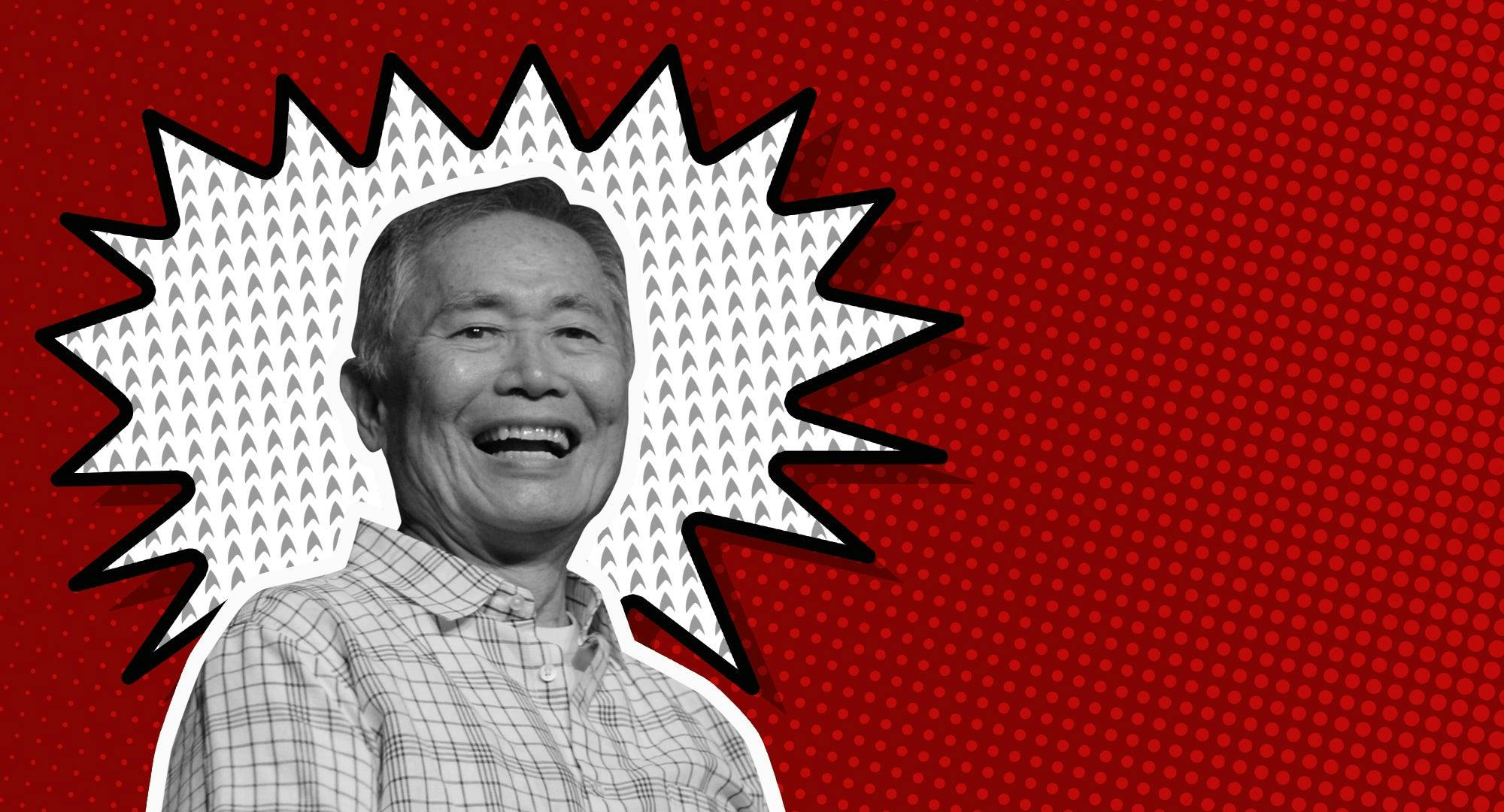
StarTrek.com
This interview originally ran on August 20, 2014. It's reposted today in honor of George Takei's 85th birthday.
George Takei is an actor, Star Trek legend, LGBT rights activist, Howard Stern announcer, author, voiceover artist, real estate mogul, Internet sensation, and so much more. Thanks in part to great TV roles and an acclaimed role in a Broadway-bound musical (Allegiance, a musical about his experiences at a Japanese American internment camp during World War II), Takei has enjoyed a career and cultural renaissance over the past decade, making the timing perfect for the new documentary To Be Takei.
Producer-director Jennifer M. Kroot convinced the Trek actor and his husband, Brad Altman, to participate in the making of the film, which centers around Takei's life and career. Joining Takei on screen are his fellow surviving Star Trek co-stars: Leonard Nimoy, Walter Koenig, Nichelle Nichols, and the captain himself, William Shatner. To Be Takei, will open in theaters on August 22, 2014 and, that same day, be available on all VOD platforms, including iTunes and Amazon Instant Video.
When we met with Takei in New York City he was in good spirits, impeccably dressed, and as talkative as ever as we asked him about the documentary, his other current projects, and the upcoming 50th anniversary of Star Trek.
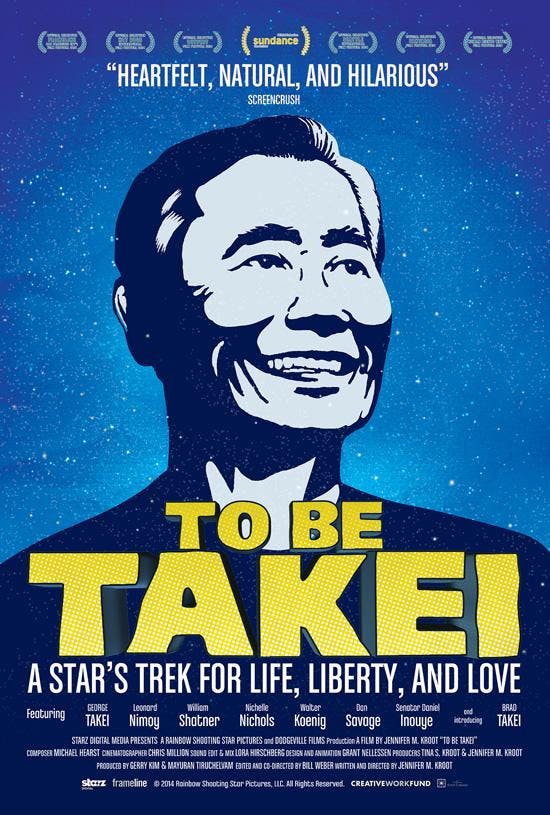
StarTrek.com: How and when were you approached to do To Be Takei, and what was your initial reaction to the idea?
George Takei: I think it was 2010, and [Brad and I] didn’t know Jennifer at all. We’d never heard of her. So we immediately did some homework on her past works. So many actors get vanity projects done about them, which make them look more glamorous, more intelligent and more charming, and we didn’t want that. We saw the idea of a documentary as being a vehicle to help us with our advocacy for LGBT equality, and also to demonstrate the normalcy of our relationship, as well as the craziness of my career.
We wanted to trust the documentarian, so we had many, many meetings and meals together with Jennifer, to get a feel for her, for why she wanted to do a documentary on us. And we found that we shared common values and common aspirations. She’s a strong supporter of LGBT equality. So we said, “We don’t want a vanity project. We will not censor you. We will not ask for final cut approval. You have carte blanche. We trust you, and please honor that trust.”
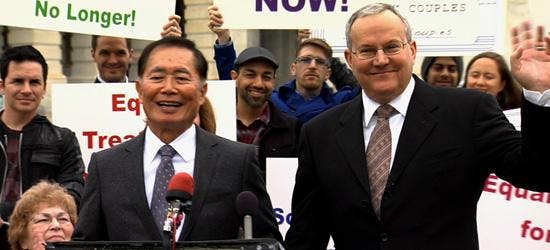
The reality is that you’ve been a public figure and in the public eye for decades, but what was it like to have cameras on you pretty much 24-7 — even in your car — for such an extended period of time?
GT: [It took] three years. I’m used to cameras, even in our private moments. And I walked into this knowing that’s what it was going to take.
For Brad, it was not so easy. He liked to know when filming was beginning, and when it was finished. There’s a bit they kept in the movie, where we went out for a walk from our house. Brad didn’t want our front door shown because there are fans who drive around looking for people’s houses. He went hysterical, [saying] “No! Turn off the cameras!” I said, “It’s all right, it’s all right.” So, Brad was very uncomfortable with it. In retrospect, I kind of wish we could have asked her to excise certain parts.
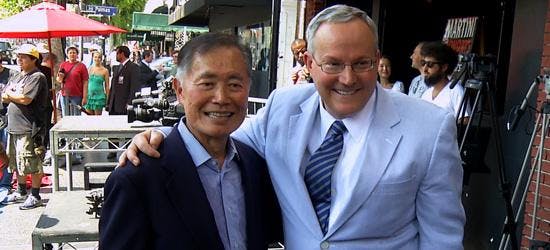
How pleased were you that Leonard Nimoy, Nichelle Nichols and Walter Koenig participated. And, how shocked were you that your frequent sparring partner, William Shatner, participated too?
GT: We wanted everybody. The Star Trek family is a family, even if we squabble. I was very happy to have Leonard, Nichelle and Walter. Bill [Shatner], he demurred [at first]. Then Bill found something that he needed from me. He was doing that one-man show that he traveled the country with, and he wanted to use a clip of me from the [Comedy Central] roast. So I told Jennifer, “We have some bargaining chips.”
She’d approached him [initially] and was turned down. She came back to us and said, “Is there any way you can persuade him?” We said, “No, no, there isn’t.” Then when he came to me to sign a release for that roast footage, I said to Jennifer, “You want to dicker with him?” So we used that release as the commodity. [Bill] said, “No more than 10 minutes.” Then how he used that 10 minutes was silly, [saying] “I don’t know the man.”
Well, why did he make such a big fuss about not being invited to our wedding if he really doesn’t know me? It’s crazy, his carryings-on. Then we found out two months later why he made that big fuss. His talk show, Raw Nerve, was coming out and he wanted publicity. Just announcing that you have a new show won’t get you that kind of publicity, unless you have a little whoo-ha.
What’s the latest on your musical, Allegiance? It had such a great run at the Old Globe Theatre in San Diego. Will the production eventually reach Broadway?
GT: We have been waiting for a year and a half now for a theater vacancy. We at first thought it was this unusual circumstance of every theater in New York City being booked up. So we got in line with other producers and patiently waited. But then, what we’re discovering is that these old, grizzled veteran producers, who have brought a lot of box office successes to the Shuberts or the Nederlanders, can sail in from left field and say, “Hey, old buddy, I’ve got another one here… When Bridges of Madison County closes, we’d like to take over.” It’s the Broadway Old Boys’ club and we think that’s awfully unfair, but that’s the way it is.
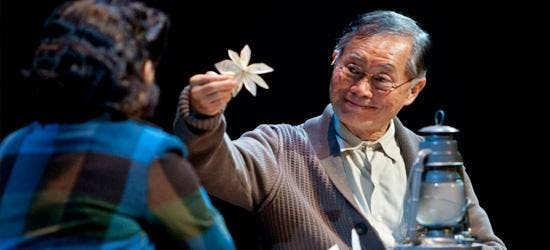
So you’re still on that line, waiting your turn?
GT: We are, but we also have a strategy. We are going to try to partner with one of the grizzled, old-time producers. So we hope to be on Broadway later this year or early next year. But we will be on Broadway.
What’s your relationship with Sulu and Star Trek these days? Is he still a part of your daily life? Is Star Trek still a part of your day-to-day existence?
GT: Sulu is a part of my life and Star Trek is a part of my life, but they’re a bit removed just because of the passage of time. Did you see the movieBoyhood? Time does things. And, as I say in the documentary, “I’m a different guy.” I look different. I sound different. I think differently. But I’m proud of Sulu and I’m proud of my association with Star Trek. It’s just two years until we celebrate the 50th anniversary of Star Trek, the golden anniversary. To be associated with that kind of extraordinary phenomenon, with such an unusual, landmark production is something to be very proud of.
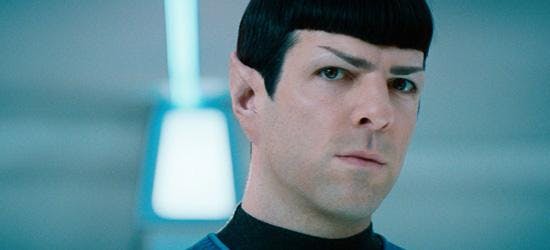
During the window between Star Trek (2009) and Star Trek Into DarknessZachary Quinto revealed that he was gay. How proud were you, and how did you feel about him being able to do so so early in his own relationship to Star Trek?
GT: I applaud him for doing so, and I also envy him that society has changed enough that an actor can come out and still be embraced and still work. At the height of my career as Sulu, I would probably never have returned in the [Star Trek] feature films if I had done that. Society was different then. They weren’t ready for it. Hollywood wasn’t ready for it. Now, it’s a measure of our society that people like Zachary or Neil Patrick Harris can be who they are, fully, and still have not only a viable career, but ascendant, growing careers. Zachary was brilliant in Angels in America and also in The Glass Menagerie. His performance in The Glass Menagerie — that was the best Tom Wingfield that I’ve ever seen. And Zachary is going to be doing a lot more important work in the years to come.
You mentioned the upcoming 50th anniversary of Star Trek. You, in the past, have marveled about the franchise’s 25th anniversary, the 30th, the 35th, etc. But, really, 50 is a magic number, wouldn’t you agree?
GT: It’s remarkable. What other show can make that kind of claim? It’s especially remarkable because we were practically 'cellar dwellers' as a TV show. First of all, for it to come back as a feature film a decade after cancellation was unheard of. Then, for it to become a series of feature films, followed by a series of spin-off shows… it’s unprecedented. It’s a singular phenomenon, Star Trek. To be a part of that, I think, is something we all hold with pride.

What else are you working on these days?
GT: I still do a lot of voiceovers, for commercials and for animated shows. The days are blurring, but while we’ve been doing publicity for To Be Takei, I’ve also carved out time to do some voiceover work for a new Nickelodeon animated series. I voice a sea creature, and my name is Major Bummer[laughs]. Major Bummer is a big fish — a big fish that lords it over the other little fish, the mollies.
Some shows are done with the cast together, but this is me solo in a booth, recording my dialogue. So, right now, my time is being spent promoting To Be Takei, doing the voiceovers, and trying to make sure that we get Allegiance to Broadway in the very near future. Hopefully the next time we talk it will be about Allegiance opening on Broadway!
This interview has been edited and condensed.
Be sure to follow Takei at his official site, on Facebook and on Twitter at @GeorgeTakei.

